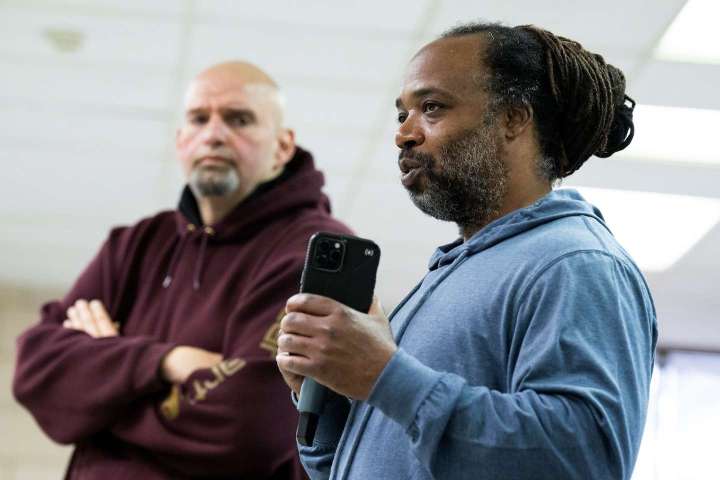Politics has a way of flattening things. It shreds nuance and context, and crudely reframes morally knotty conundrums into simplistic questions of good or evil, right or wrong, us or them.
Freed after years in prison, Pennsylvania brothers become political fodder

The Hortons grew up in a housing project in Philadelphia. Despite growing up without many advantages, the two men were doing well for themselves by their twenties. Lee Horton had a wife and four kids, at times working two jobs to support his family. He had applied to become a police officer, and his acceptance letter would soon arrive in the mail.
Dennis Horton, five years younger than Lee, had also applied to be a police officer. At the time of his arrest, he was engaged, making plans to attend college, and had a steady job at a local synagogue.
As the brothers have told it in court documents, their lives were abruptly upended during a family cookout in May of 1993 when Lee asked his brother to go with him to get some beer. On the way back, Lee spotted an old friend named Robert Leaf. The friends chatted for a bit, after which they decided Leaf would ride with the brothers back to Lee’s house. The Hortons say they weren’t aware of it at the time, but Leaf was fleeing police. He and at least one other man had just robbed a bar and, in the course of the robbery, shot up the place, killing one and wounding several others.
The three were stopped by the police, arrested and charged for the robbery and murder. Police offered the Horton brothers a deal: testify against Leaf, and they’d get the lesser charge of third-degree murder, punishable by 4-10 years. They refused — because, they say, they weren’t guilty and hadn’t seen Leaf commit the crime. Leaf got a similar offer. He would end up testifying against the brothers. He was paroled in 2008.
The Hortons were convicted based on Leaf’s negotiated accusation and eyewitnesses who claimed the brothers were part of the robbery team. Eyewitness testimony is notoriously unreliable, but ideally, a witness identifies a perpetrator from a photo or in-person lineup of similar-looking people. In this case, all three eyewitnesses were asked to look inside a police wagon where Leaf and the Hortons had been detained. Not surprisingly, they identified the three men, though their accounts would be inconsistent and contradictory.
The police initially believed Leaf was the gunman, but later changed their narrative to make Dennis Horton — a man with no prior convictions and no history of violence — the shooter. The Hortons were convicted and given life sentences. They were incarcerated for almost 28 years, nearly 13 years longer than Leaf.
Over time, the Hortons and their attorneys would discover police notes identifying Leaf as the shooter, a prisoner who claimed Leaf had confessed to him and exonerated the Hortons, and incriminating statements Leaf made to police. None of that was enough to move the courts.
Amid all this, the Hortons were model prisoners. They studied in the prison legal library, became mental health counselors and spiritual advisers for other prisoners, ran prison substance abuse programs, and started a restorative justice initiative. They received praise and commendations from sources inside and outside the walls, including a prison superintendent and a Pennsylvania legislator.
In 2020, led by Lt. Gov. John Fetterman, the Pennsylvania Board of Pardons unanimously recommended that the Hortons be granted clemency. Gov. Tom Wolf agreed, and in February of 2021 the two men were released on parole. Since then, they’ve continued to mentor and counsel current and former prisoners and have participated in a violence interruption program.
Fetterman, who was moved to tears by the brothers’ testimony before the pardon board, later announced his candidacy for the U.S. Senate. He hired the brothers to work on his campaign.
Last month, right-wing media got hold of the brothers’ story, and the attacks began. Fetterman’s opponent, Mehmet Oz, accused him of paying “two convicted murderers.” Oz later hired actors to pose in orange jumpsuits as “convicts for Fetterman” at campaign events. National Republican Senatorial Committee spokesperson Lizzie Litzow implored Fetterman to “start putting Pennsylvania communities ahead of murderers and other criminals,” and said he “can start by firing the two convicted murderers he’s employed.”
I don’t know if the Hortons are innocent. But if they are, it wouldn’t be the first time conservatives have made political hay of “convicted killers” who turned out to be innocent. There’s certainly plenty of reason to question their guilt.
In any case, innocence aside, the Hortons’ story should inspire difficult conversations about justice, absolution and rehabilitation. Instead, we’re getting the Republican narrative, which amounts to screaming “Murderers!” while wildly gesticulating in the general direction of crime.
That’s what politics does. It flattens everything in its way.






